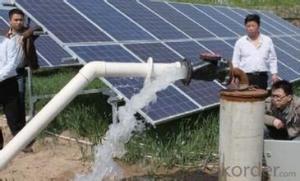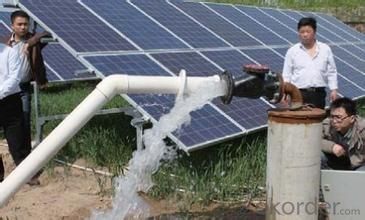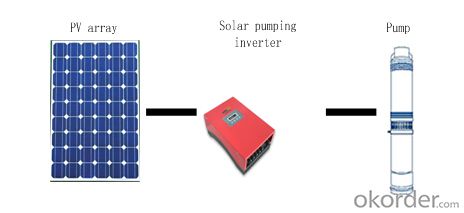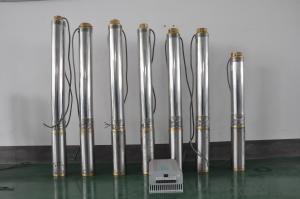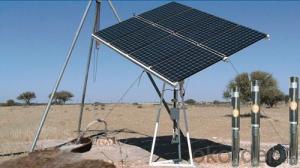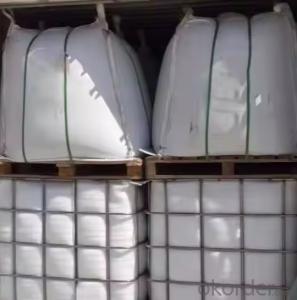Solar Water Pump System 0.1KW-37KW for Agricultural Irrigation/ Helen
- Loading Port:
- Shanghai
- Payment Terms:
- TT OR LC
- Min Order Qty:
- 10 pc
- Supply Capability:
- 1000 pc/month
OKorder Service Pledge
OKorder Financial Service
You Might Also Like
The photovoltaic pumping system is different from the traditional AC pumping system , and the photovoltaic pumping system utilizes solar cells convert solar energy into electric energy , then the photovoltaic pumping inverter drives ac motor for the pump running , and pumping up water from water well , river , lake etc areas and then transport to the destination to satisfy our requests for the water demand .
Photovoltaic arrays adopts solar radiation energy to convert it to electric power ,providing the motive power for the whole system . And the function of the solar pumping inverter is converting the DC power output from PV array to AC power to drive the pump to finalize the water pumping up as well as adjusting the output power real-timely according to the change of sunlight intensity , in this way , the system realizes the max power point tracking and the solar energy can be utilized furthest
The whole system solves the water pumping up requests perfectly , omitting the battery bank and charge controller etc equipments , so it is very economical and environmental . Since they are with the merits of low carbon , energy conversation , environmental protection etc , so they have a broad market foreground and great social value
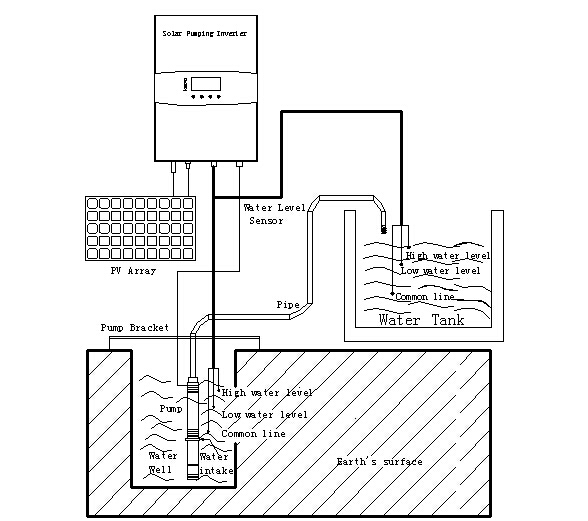
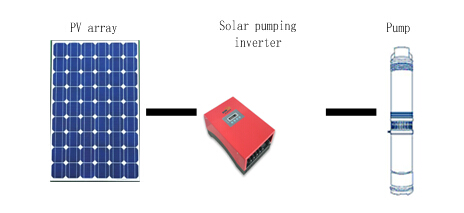
2.2 Application
Agricultural irrigation
Desert manage
Domestic water
Grassland animal husbandry
city waterscape
Island water supply
Landscape and fountain system of municipal engineering , city square , hotels and residence community
2.3 About product
This product is using a high performance digital signal processing chip, can provide solution for solar water pumpingsystem with high cost performance. Solar pumping system as a whole block diagram as shown in 2.
SHP series inverter has the following features:
a. True max power tracking technology (TMPPT) with our own intellectual property; effectively improve the use ratio of PV array. The stable tracking efficiency can reach 99.2% , Solving the problem of bad tracking efficiency and running unstability under the situation of sunlight intensity quick change when comparing with the traditional MPPT method .
b. Adopt efficient IPM power module from Mitsubishi Company with high reliability.
c. With the function of high and low water level detection , high safety factor.
d. Automatic anti-drying protection function , with multi-protection for motor
e. Multi-language LCD display , easy for operation , very user-friendly
f. The independent developed principal computer with our own intellectual properties , remote monitoring is available
g. Modular design , direct plug-in terminal , good-looking appearance, easy for installation , operation and maintenance .
h. Suitable for the pump adopted three phase asynchronous motor
i. Complete digital control , with the function of full automatic running and data storage .
j. Perfect protection system , with the protection function for lighting , over voltage , under voltage , short circuit , over loads , water drain off , low sunlight , over heating etc ,
k. Adopt the complete radiating system , so radiating efficiency is better and the service life is longer
l. Through strict environmental test , adapt the rigorous environment :-10℃~+50℃
m.No impacted mains supply power switch function (optional ), All-weather running available
n. Through strict environmental test , adapt the rigorous environment :-10℃~+50℃
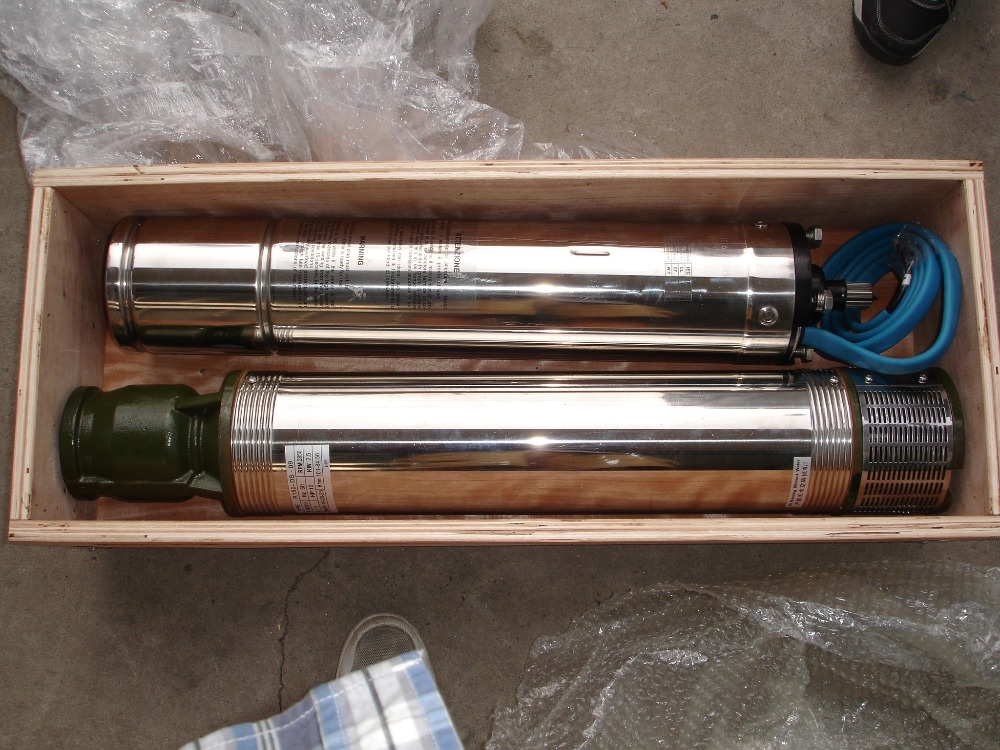
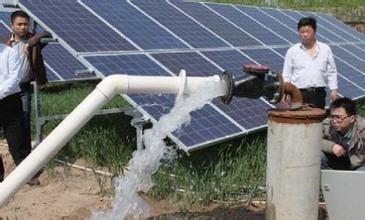
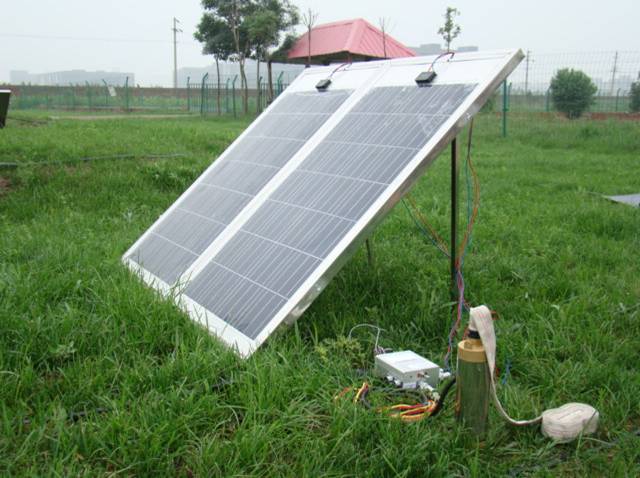
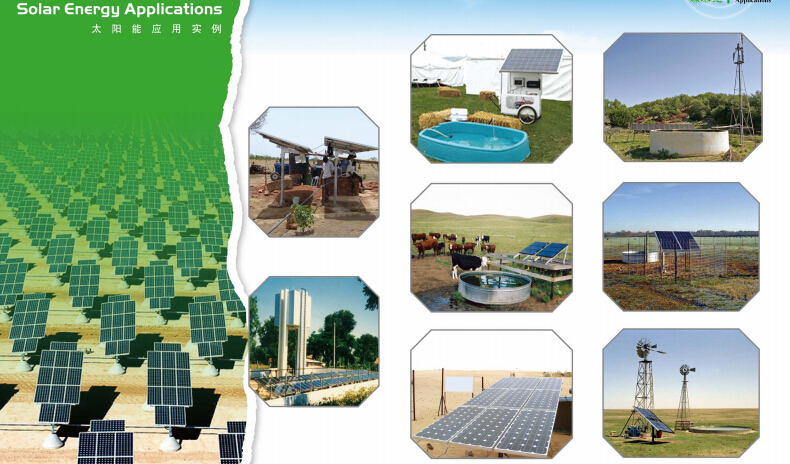
- Q:Can a solar pump be used for water transfer between reservoirs or tanks?
- Yes, a solar pump can be used for water transfer between reservoirs or tanks. Solar pumps are designed to efficiently draw water from one source and transfer it to another, making them ideal for applications such as transferring water between reservoirs or tanks. They utilize solar energy to power the pump, eliminating the need for electricity and making them cost-effective and environmentally friendly solutions for water transfer.
- Q:How does a solar pump handle water source contamination from nearby industries?
- A solar pump does not have the capability to directly handle water source contamination from nearby industries. However, it can be integrated with appropriate filtration and purification systems to mitigate the effects of contamination and ensure safe water supply.
- Q:Are there any government incentives or rebates for installing a solar pump?
- Yes, there are government incentives and rebates available for installing a solar pump. Many countries and regions offer various programs and schemes to promote the use of renewable energy, including solar-powered technologies like solar pumps. These incentives can range from tax credits, grants, subsidies, and rebates, which can significantly reduce the upfront costs of installing a solar pump and make it more financially viable for individuals and businesses. It is recommended to check with local government agencies or renewable energy organizations to learn about specific incentives available in your area.
- Q:How does the cost of a solar pump compare to a traditional pump?
- The cost of a solar pump typically varies depending on the size and capacity of the system, as well as the specific brand and model. However, in general, the upfront cost of a solar pump is higher than that of a traditional pump. Traditional pumps are typically powered by electricity or diesel, which are relatively inexpensive energy sources. On the other hand, solar pumps utilize solar panels to convert sunlight into energy, which can be costly to install and maintain. Although the initial investment in a solar pump may be higher, it is important to consider the long-term financial benefits. Solar pumps do not require any fuel or electricity to operate, making them significantly cheaper to run and maintain over time. This can result in substantial savings on energy costs, especially in areas with ample sunlight. Additionally, solar pumps have a longer lifespan compared to traditional pumps, reducing the need for frequent replacements and repairs. Furthermore, solar pumps are environmentally friendly as they produce no greenhouse gas emissions and have a minimal carbon footprint. This can be particularly advantageous for individuals or organizations looking to reduce their environmental impact and contribute to sustainable practices. In summary, while the initial cost of a solar pump may be higher compared to a traditional pump, the long-term savings on energy costs and the environmental benefits make it a worthwhile investment.
- Q:Can a solar pump be used for water purification?
- Yes, a solar pump can be used for water purification. Solar pumps are often used in combination with water purification systems to provide a sustainable and environmentally friendly solution for accessing clean and safe water. These pumps are powered by solar energy, which means they do not require electricity from the grid or fuel for operation. Solar pumps can be used to extract water from wells, rivers, or other water sources, and then the water can be purified through various methods such as filtration, UV treatment, or chemical disinfection. This combination of solar pumping and water purification can be particularly beneficial in remote or off-grid areas where access to electricity is limited, and it can help improve access to clean water for drinking, cooking, and other domestic or agricultural purposes.
- Q:Are there any maintenance requirements for solar pumps?
- Yes, solar pumps require regular maintenance to ensure optimal performance and longevity. This includes cleaning the solar panels to remove dirt and debris, checking the pump's connections and wiring for any damage or loose connections, inspecting and lubricating moving parts, and monitoring the pump's performance regularly. Additionally, batteries, if used, may require periodic maintenance such as checking fluid levels and cleaning terminals. Proper maintenance helps to maximize the efficiency and reliability of solar pumps.
- Q:Can a solar pump be used in conjunction with a water storage reservoir?
- Indeed, a water storage reservoir can be effectively paired with a solar pump. These pumps are specifically designed to operate solely on solar power, granting them the ability to function independently from the electrical grid. Harnessing energy from solar panels, they convert sunlight into electricity, which effectively powers the pump and facilitates the movement of water from one area to another. When it comes to a water storage reservoir, the solar pump can be employed to fill the reservoir during daylight hours when the sun's rays are abundant. Consequently, the accumulated water can be utilized as needed, even in the absence of sunlight. This arrangement offers a sustainable and highly efficient method of storing and distributing water by harnessing the power of renewable energy.
- Q:What are the different applications of solar pumps?
- Solar pumps have a wide range of applications, including irrigation for agriculture, supplying drinking water in remote areas, livestock watering, and even for small-scale industrial purposes like cooling and heating systems.
- Q:Can a solar pump be used for water supply in off-grid wildlife conservation areas?
- Yes, a solar pump can be used for water supply in off-grid wildlife conservation areas. Solar pumps are a sustainable and environmentally friendly solution that relies on solar energy to power the pump and provide water supply. This eliminates the need for grid electricity or fuel-based generators, making it a suitable choice for remote conservation areas. Additionally, solar pumps can be easily installed and require minimal maintenance, ensuring a reliable and continuous water supply for the conservation of wildlife in off-grid areas.
- Q:Can a solar pump be used for wastewater recycling?
- Yes, a solar pump can be used for wastewater recycling. Solar pumps are an environmentally friendly and cost-effective solution for pumping water, including wastewater, using solar energy. By utilizing solar power, these pumps can help in the process of recycling wastewater for various purposes such as irrigation, industrial uses, or even for non-potable water needs.
1. Manufacturer Overview |
|
|---|---|
| Location | |
| Year Established | |
| Annual Output Value | |
| Main Markets | |
| Company Certifications | |
2. Manufacturer Certificates |
|
|---|---|
| a) Certification Name | |
| Range | |
| Reference | |
| Validity Period | |
3. Manufacturer Capability |
|
|---|---|
| a)Trade Capacity | |
| Nearest Port | |
| Export Percentage | |
| No.of Employees in Trade Department | |
| Language Spoken: | |
| b)Factory Information | |
| Factory Size: | |
| No. of Production Lines | |
| Contract Manufacturing | |
| Product Price Range | |
Send your message to us
Solar Water Pump System 0.1KW-37KW for Agricultural Irrigation/ Helen
- Loading Port:
- Shanghai
- Payment Terms:
- TT OR LC
- Min Order Qty:
- 10 pc
- Supply Capability:
- 1000 pc/month
OKorder Service Pledge
OKorder Financial Service
Similar products
New products
Hot products
Hot Searches
Related keywords
